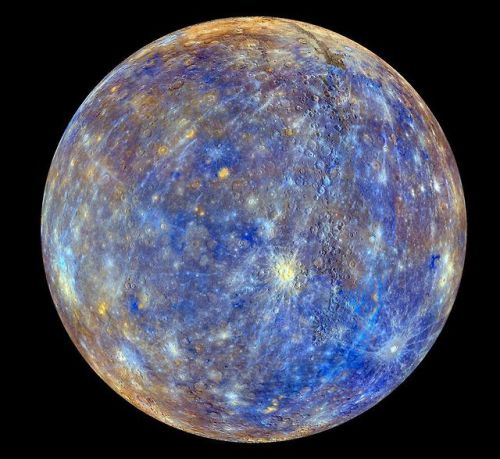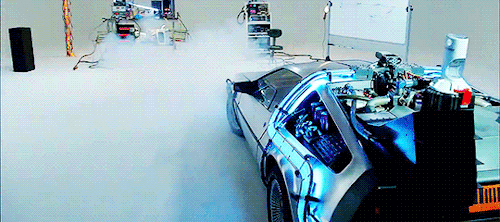Inter-stellxr-blog - Lost Among The Stars

More Posts from Inter-stellxr-blog and Others

Astronomers have found compelling signs for a supermassive black hole in the center of almost every large galaxy they have scrutinized, and the Milky Way is no exception. The core of our galaxy harbors an object called Sagittarius A* (pronounced A-star) — a black hole with about 4 million times the Sun’s mass. It’s the 19th confirmed black hole in the Milky Way, and it sits dead in the center.
The evidence takes several forms. First, intense radio waves and X-rays flow from an accretion disk that spans a region no bigger than our solar system. But the proof comes from careful tracking of the motions of stars as they orbit the central mass. It’s the same method astronomers use to hunt for globular cluster black holes, but the huge size of the object in the Milky Way’s heart makes these motions far easier to see. Analyzing the stellar orbits leads directly to the black hole’s mass.
The count of black holes in our galaxy likely will continue to grow in the years ahead, but it never will outpace the flood of planet discoveries. The ability to find planets has reached the stage where it’s surprising when a week goes by without a new detection. Black holes hide their identities much better, either behind the cloak of an event horizon or in isolation from other objects. Perhaps the biggest surprise in the study of our galaxy’s black holes is that we’ve already found 19.
[Continue Reading→]
Were Troy’s walls not built by Gods? Was Rome not made by two twin half-blood gods? QUESTION: What do they both have in common? ANSWER: They both fell.
the gods like to make things that collapse // L.H.Z (via lhzthepoet)








NASA just released a brand new equirectangular projection of Jupiter, so I thought it would be fun to revisit the surface of some planetary bodies … IN CONTINUOUSLY LOOPING GIF FORM.
So here’s
Mercury
Venus
Earth
Earth’s moon
Mars
Jupiter
Ganymede (one of Jupiter’s moons)
Pluto
Credit: NASA/JPL, USGS
![Some Estimations On The Costs Of Going To Mars [infographic] Http://space-pics.tumblr.com/](https://64.media.tumblr.com/3e39297651d1abea02e220c4e1ed4c51/tumblr_nxzn1oQ1UU1rcl722o1_1280.jpg)
Some estimations on the costs of going to mars [infographic] http://space-pics.tumblr.com/





A Reddit user captured several phenomenal photos of the solar eclipse, from the cockpit of an airplane.

Curiosity moved approximately 8.0m ESE (119º) on Sol 1151. Quick stitch of the available end-of-drive Navcams. More info to follow
http://space-pics.tumblr.com/
10 Intriguing Worlds Beyond Our Solar System
In celebration of the 20th anniversary of the first confirmed planet around a sun-like star (aka exoplanet), a collection of some interesting exoplanets has been put together. Some of these are rocky, some are gaseous and some are very, very cold. But there’s one thing each these strange new worlds have in common: All have advanced scientific understanding of our place in the cosmos. Check out these 10 exoplanets, along with artist’s concepts depicting what they might look like. For an extended list of 20 exoplanets, go HERE.
1. Kepler-186f

Kepler-186f was the first rocky planet to be found within the habitable zone – the region around the host star where the temperature is right for liquid water. This planet is also very close in size to Earth. Even though we may not find out what’s going on at the surface of this planet anytime soon, it’s a strong reminder of why new technologies are being developed that will enable scientists to get a closer look at distance worlds.
More Info
2. HD 209458 b (nickname “Osiris”)

The first planet to be seen in transit (crossing its star) and the first planet to have it light directly detected. The HD 209458 b transit discovery showed that transit observations were feasible and opened up an entire new realm of exoplanet characterization.
More info
3. Kepler-11 system

This was the first compact solar system discovered by Kepler, and it revealed that a system can be tightly packed, with at least five planets within the orbit of Mercury, and still be stable. It touched off a whole new look into planet formation ideas and suggested that multiple small planet systems, like ours, may be common.
More info
4. Kepler-16b

A real-life “Tatooine,” this planet was Kepler’s first discovery of a planet that orbits two stars – what is known as a circumbinary planet.
More info
5. 51 Pegasi b

This giant planet, which is about half the mass of Jupiter and orbits its star every four days, was the first confirmed exoplanet around a sun-like star, a discovery that launched a whole new field of exploration.
More info
6. CoRoT 7b

The first super-Earth identified as a rocky exoplanet, this planet proved that worlds like the Earth were indeed possible and that the search for potentially habitable worlds (rocky planets in the habitable zone) might be fruitful.
More info
7. Kepler-22b

A planet in the habitable zone and a possible water-world planet unlike any seen in our solar system.
More info
8. Kepler-10b

Kepler’s first rocky planet discovery is a scorched, Earth-size world that scientists believe may have a lava ocean on its surface.
More info
9. Kepler-444 system

The oldest known planetary system has five terrestrial-sized planets, all in orbital resonance. This weird group showed that solar systems have formed and lived in our galaxy for nearly its entire existence.
More info
10. 55 Cancri e

Sauna anyone? 55 Cancri e is a toasty world that rushes around its star every 18 hours. It orbits so closely – about 25 times closer than Mercury is to our sun – that it is tidally locked with one face forever blistering under the heat of its sun. The planet is proposed to have a rocky core surrounded by a layer of water in a “supercritical” state, where it is both liquid and gas, and then the whole planet is thought to be topped by a blanket of steam.
More info


The first structural test article of Orion’s Service Module arrived at NASA’s Glenn Research Center in Cleveland, Ohio yesterday (November 9). Manufactured by Airbus Defense and Space in Europe, (the same company who built the Automated Transfer Vehicle), the European Service Module will provide Orion’s electrical, propulsion and umbilical capabilities during flight. A single Orbital Maneuvering System engine leftover from the Space Shuttle program will power the spacecraft, and four 11-kilowatt solar panels will generate electrical power. The STA will be used for fit checks and other engineering tests at NASA’s Plumb Brook facility, which is a sub-facility of Glenn. An Antonov-124 aircraft, the second largest cargo plane in the world delivered the ESM STA to Cleveland International Airport November 9.


We are not allowed to collect water from Mars. The Outer Space Treaty of 1967 forbids every nation in the world from sending humans or robots near celestial water sources for fear of contaminating them with life from Earth. Source






Thanks, Doc
-
 rohzzzzz reblogged this · 1 week ago
rohzzzzz reblogged this · 1 week ago -
 oxygen8destroyer reblogged this · 3 weeks ago
oxygen8destroyer reblogged this · 3 weeks ago -
 zyzdzdzyzyzyzyz liked this · 1 month ago
zyzdzdzyzyzyzyz liked this · 1 month ago -
 gagagagagugagaga reblogged this · 1 month ago
gagagagagugagaga reblogged this · 1 month ago -
 2die4crys reblogged this · 1 month ago
2die4crys reblogged this · 1 month ago -
 takemetoyourspeakers reblogged this · 1 month ago
takemetoyourspeakers reblogged this · 1 month ago -
 takemetoyourspeakers liked this · 1 month ago
takemetoyourspeakers liked this · 1 month ago -
 westdayever reblogged this · 1 month ago
westdayever reblogged this · 1 month ago -
 integralpetal liked this · 2 months ago
integralpetal liked this · 2 months ago -
 myxlogkeepsxettingxeleted reblogged this · 2 months ago
myxlogkeepsxettingxeleted reblogged this · 2 months ago -
 mahurutanga reblogged this · 3 months ago
mahurutanga reblogged this · 3 months ago -
 n3v3r3v3rrr liked this · 3 months ago
n3v3r3v3rrr liked this · 3 months ago -
 tailesssheepdog reblogged this · 3 months ago
tailesssheepdog reblogged this · 3 months ago -
 geminice reblogged this · 5 months ago
geminice reblogged this · 5 months ago -
 ultramilkshakeblr liked this · 5 months ago
ultramilkshakeblr liked this · 5 months ago -
 animallovercats liked this · 5 months ago
animallovercats liked this · 5 months ago -
 xskullsaladsx reblogged this · 6 months ago
xskullsaladsx reblogged this · 6 months ago -
 godofwarotabekaltin liked this · 6 months ago
godofwarotabekaltin liked this · 6 months ago -
 kashiismagic reblogged this · 7 months ago
kashiismagic reblogged this · 7 months ago -
 mimiso-soup reblogged this · 7 months ago
mimiso-soup reblogged this · 7 months ago -
 mimiso-soup liked this · 7 months ago
mimiso-soup liked this · 7 months ago -
 the-hollows-are-my-home reblogged this · 7 months ago
the-hollows-are-my-home reblogged this · 7 months ago -
 fivegreenstars reblogged this · 8 months ago
fivegreenstars reblogged this · 8 months ago -
 calliopecadence reblogged this · 8 months ago
calliopecadence reblogged this · 8 months ago -
 calliopecadence liked this · 8 months ago
calliopecadence liked this · 8 months ago -
 no-starless-sky reblogged this · 8 months ago
no-starless-sky reblogged this · 8 months ago -
 haleanne reblogged this · 9 months ago
haleanne reblogged this · 9 months ago -
 humanityinmotion reblogged this · 9 months ago
humanityinmotion reblogged this · 9 months ago -
 technicallyimportantperfection reblogged this · 10 months ago
technicallyimportantperfection reblogged this · 10 months ago -
 dunklesonne reblogged this · 10 months ago
dunklesonne reblogged this · 10 months ago -
 lapistolera reblogged this · 11 months ago
lapistolera reblogged this · 11 months ago -
 yula7o7 reblogged this · 11 months ago
yula7o7 reblogged this · 11 months ago -
 dancing-bears-in-my-head reblogged this · 11 months ago
dancing-bears-in-my-head reblogged this · 11 months ago -
 littlecrowsblog liked this · 11 months ago
littlecrowsblog liked this · 11 months ago -
 309b89 liked this · 11 months ago
309b89 liked this · 11 months ago -
 ravenheart-1995 liked this · 11 months ago
ravenheart-1995 liked this · 11 months ago -
 83lions liked this · 11 months ago
83lions liked this · 11 months ago -
 devilishschemes reblogged this · 11 months ago
devilishschemes reblogged this · 11 months ago -
 sikerlerr reblogged this · 11 months ago
sikerlerr reblogged this · 11 months ago -
 golarsworld liked this · 11 months ago
golarsworld liked this · 11 months ago -
 shoelace4-48 liked this · 11 months ago
shoelace4-48 liked this · 11 months ago -
 sublimedelusionwerewolf liked this · 11 months ago
sublimedelusionwerewolf liked this · 11 months ago -
 y0u-want-to-be-mine reblogged this · 11 months ago
y0u-want-to-be-mine reblogged this · 11 months ago -
 the-ghost-inthe-background reblogged this · 11 months ago
the-ghost-inthe-background reblogged this · 11 months ago -
 jamesrslattery liked this · 11 months ago
jamesrslattery liked this · 11 months ago
"I don't know who will read this. I guess someone will find it eventually. Maybe in a hundred years or so." -Mark Watney
174 posts